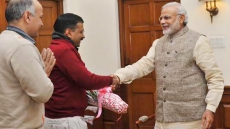TORONTO — Sarah Mulholland vividly remembers the first time her 13-month-old son called out "Mama."
She was cooking about two months ago when little Conri began clamouring for her attention, clinging to her legs and whining until he suddenly uttered those two simple syllables that send mothers' hearts fluttering.
"My husband was in the room and we both were like, 'Oh my gosh, did he just say Mama?'" recalls Mulholland, adding that Conri seemed to be directing his call specifically at her.
"We both noticed it and were like, 'Whoa!'"
But the apparent milestone evaporated as quickly as it appeared.
Conri has never said "Mama" again, even when babbling, sighs the 38-year-old Toronto resident. He now seems headed in a completely different direction.
"My husband walks in the door and he's like, 'Dadadadada!'," she says.
It's far from clear whether Conri understands what he's saying, but that hasn't stopped Mulholland's husband from revelling in the attention as Mother's Day approaches.
"I think he's really enjoying the fact that (Conri) is probably going to say 'Dada' first. He's like, 'Oh, my time has come!'"
There's little debate that mama and dada are often among baby's first utterances — which usually start around the seven or eight-month mark.

But they can't really be called words until there's intent, and that doesn't typically happen until after 12 months of age, says developmental psychologist Janet Werker of the University of British Columbia, who heads the school's Infant Studies Centre.
UBC researcher Jenn Campbell cites a study conducted with kids in the United States and China that found their earliest words to be utterances for daddy, followed closely by mommy. The children were between eight and 16 months of age and came from English, Cantonese or Mandarin households.
Campbell's own research found that babies as young as six months can understand labels for their mother and father —even though they might not utter those sounds for another month or two, or say them with intent for another six months or more.
Her study observed 40 six-month-olds who were shown video images of their parents and asked to link the words mommy and daddy — or whatever term is used in their household — to the correct parent.
From a phonetics standpoint, it's much easier to say mama than dada, says Heather Goad, an associate professor in linguistics at Montreal's McGill University.
Mama can be produced by doing little more than closing and opening the mouth, she explains. The D sound requires a more complicated tongue gesture.

"For P, B and M they involve both lips and you just vocalize," says Goad, who studies language acquisition from age one onwards.
"But with T, D and N, you need to place your tongue behind the teeth or a little further back — you have to consciously make that gesture; you have to manipulate the tongue more."
Monikers with two vowel sounds are also more complicated — mommy versus mama, or daddy versus dada, she adds.
It's for these reasons that fathers eagerly awaiting baby's first shout-out might want to consider going by papa instead of dada or daddy, she chuckles, noting it's not that far off from mama.
But ease of production doesn't necessarily mean a baby will say mama before dada.
Campbell believes they both appear with equal frequency, while Werker says there are lots of studies that suggest dada comes earlier as an actual word.
Mulholland wonders if Conri has latched on to the word dada because he might have heard it more — she spends more time with him than her husband, and encourages him to say Daddy when they see him return from work.

Another possibility is that a baby's vocabulary is so limited they end up using dada in all sorts of inappropriate situations, says Werker.
"It certainly doesn't mean they love Daddy more than Mommy. That's unequivocal."



